Historic exclusion of children in decision-making and persistent pushback on child participation
Children have historically been excluded from discussions and decision-making at all levels, including from international policy debates on matters that directly affect them. Yet, the escalating environmental crisis, rising inequalities, and migration crisis, among others, have a heavy toll on children’s lives. All over the world, a growing number of children stand up and act to address this wide range of pressing challenges, as human rights defenders. Pervasive adultism, or the belief that adults’ opinions are inherently more valuable than children’s views, however continues to deprive children of their right to be heard and to express their views in matters affecting them. Yet, this right is enshrined in the United Nations Convention on the Rights of the Child (UNCRC).
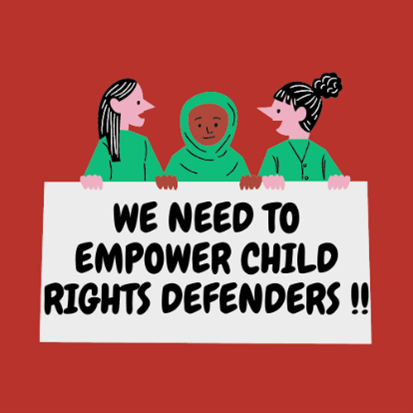
Child participation is fundamental to empowering children since it pushes adults to make the efforts to engage with children, seek their views and take their perspectives into account. The lack of child participation in internal policy debates has undermined the ability of the international community to come up with new solutions to global challenges, addressing children’s views, needs and priorities, including through a constructive intergenerational dialogue. We have first-hand experience of this at the United Nations, including as part of negotiations around Human Rights Council resolutions. For instance, the 2022 Human Rights Council resolution on human rights defenders did not include language recognizing child human rights defenders, despite previous standards set in 2019. We also saw some States trying to undermine the autonomy of children in the name of the supremacy of the family.
What have we done to push the boundaries of child participation?
At CRCnct, promoting safe, inclusive, empowering, and sustained child participation lies at the core of our mission. It defines who we are, what we strive to achieve, and how we approach our work. For years, we have fearlessly engaged in thought-provoking discussions with decision-makers, UN representatives, and other influential stakeholders. Our goal? To dismantle “adultism”, challenge prevailing mindsets, and carve out more spaces where children can participate in a secure, inclusive, empowering, and enduring manner.
Over the years, we took a leading role in advocating for and supporting the UN Committee on the Rights of the Child (CRC Committee) to establish standards and practices for child participation across all its activities. As a result, more and more children are now actively involved in monitoring, reporting, and advocating for their rights in ways that promote their recognition as human rights defenders, protection, and empowerment. In 2022, we concentrated our efforts on pushing for the broader UN human rights system and other high-level policy platforms to embrace these good practices.
Opening space for children to seat and engage at the COP27 table
The COP27, in Africa, where the youngest populations in the world live, offered a unique opportunity to integrate the voices of children in climate policy and decision-making processes. We took a proactive approach around the COP27 in Africa, recognizing the urgent need to address the climate crisis as a child rights crisis. Despite the human rights concerns in Egypt, the host country of COP27, we chose to engage with the COP27 presidency to ensure children’s voices were heard and listened to. During the September 2022 session of the Human Rights Council, our Working Group on children’s rights and the environment partnered with the Permanent Mission of Egypt to the UN in Geneva to organise a side event.

This created a platform for children’s rights at COP27, bringing together government representatives, civil society practitioners, child rights experts, and children themselves. To amplify children’s voices on a global scale, we also collaborated with Save the Children, UNICEF, and YOUNGO, the official children and youth constituency of the UNFCCC to convene a side-event, called Youth and Future Generation Day, during COP27. Children actively participated as panelists and attendees, with a young activist moderating the discussions. This event provided an opportunity to present UN-backed children’s recommendations to COP27 decision-makers, setting an important precedent for future COP meetings, a side event. This created a platform for children’s rights at COP27, bringing together government representatives, civil society practitioners, child rights experts, and children themselves. To amplify children’s voices on a global scale, we also collaborated with Save the Children, UNICEF, and YOUNGO, the official children and youth constituency of the UNFCCC to convene a side-event, called Youth and Future Generation Day, during COP27. Children actively participated as panelists and attendees, with a young activist moderating the discussions. This event provided an opportunity to present UN-backed children’s recommendations to COP27 decision-makers, setting an important precedent for future COP meetings.
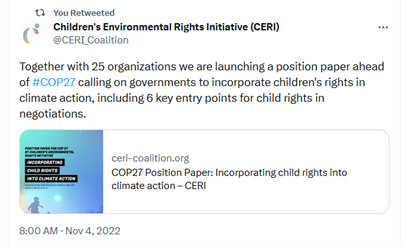
Ensuring that the ILO and States hear children’s views on how to combat child labour
In May 2022, the International Labour Organisation (ILO) organized its V Global Conference on Child Labour in South Africa. Working children had traditionally been left out of these discussions. We couldn’t let that continue. Together with 11 of our members, we joined forces with over 150 non-governmental organisations and 100 researchers supporting working children to echo the CRC Committee’s call for equal, inclusive, and transparent child participation at the conference. Our collective statement demanded change. And change happened! For the first time ever, the ILO V Global Conference on Child Labour included a dedicated forum with children’s participation on 19 May. Five representatives from the Global Children’s Advisory Team of Dialogue Works (a joint initiative of two CRCnt members, Terre des Hommes and Kindernothilfe), bravely spoke to State delegates about the challenges faced by working children. Prior to the conference, we coordinated with our members and the CRC Committee, who played a vital role in advising the ILO and supporting child participation. While there is still work to be done, this milestone is an encouraging step towards integrating children’s perspectives into international policymaking on child labour. The impact of this achievement extended beyond the conference itself. The CRC Committee engaged in follow-up discussions with CSOs and working children, seeking ways to strengthen its recommendations to States parties.
Children engaging with the CRC Committee in new ways
Another significant milestone was our Children’s Advisory Team (CAT) delivering a groundbreaking statement at the CRC Committee session in January-February 2022. It was a historic moment as children directly addressed the Committee at the opening of its session for the first time. Our child advisor from Lebanon took the stage and highlighted the importance of child rights mainstreaming. She shared how she and her fellow child advisors are working locally to advance this,and urged the Committee to establish children’s advisory teams within the UN to drive child rights mainstreaming forward.
Building on our tested model of child participation, we also empowered our member, Terre des Hommes Germany, to establish and manage a children’s advisory team in stirring the broader child participation process to shape the Committee’s General Comment No. 26 (GC26) on children’s rights and the environment, with a special focus on climate change. It was the Committee’s first-ever collaboration with child advisors in developing a General Comment. GC26 will provide authoritative guidance on governments’ responsibilities in safeguarding children’s rights in the context of the environmental crisis. To ensure its relevance to real-world challenges, we mobilized our Network and partners to engage children, including child environmental human rights defenders, in global and regional consultations. Their valuable insights and demands were instrumental in shaping GC26, as they emphasized the need for children’s participation to accurately reflect their needs, priorities, and aspirations.
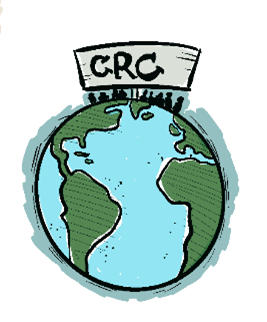
Child participation in the CRC Committee’s work heavily relies on civil society support and resources. Therefore, we intensified our efforts to foster ownership and capacity-building among UNICEF and States parties. Together with UNICEF Iceland, we developed and published a case study on child participation in Iceland’s State party report preparation, an exemplary practice that remains rare and ad hoc despite the Committee’s encouragement for States to support children in presenting their views. We also actively engaged in webinars for UNICEF Country Offices and National Committees involved in CRC pre-sessions, to build their capacity to foster child participation in CRC reporting.
For the first time, children actively engaged with Treaty Body other than the CRC Committee in the development of new authoritative guidance
Together with our partners, the University of Nottingham’s Human Rights Law Centre, the German Institute for Human Rights, and the Friedrich-Ebert-Foundation’s Geneva Office, we achieved the groundbreaking milestone of a Treaty Body other than the UN Committee on the Rights of the Child consulting with children in the development of a General Comment for the first time. In April 2022, more than 160 children from diverse backgrounds (including indigenous children, children with disabilities, migrant and refugee children) and regions worldwide gathered for three consultations with the UN Committee on Economic, Social and Cultural Rights to inform its General Comment on Sustainable Development. Through their elected representatives and with the support of national CSOs and National Human Rights Institutions (NHRIs), over 300 children were consulted overall. These consultations provided the Committee’s Drafting Group with first-hand insights into children’s lived experiences.
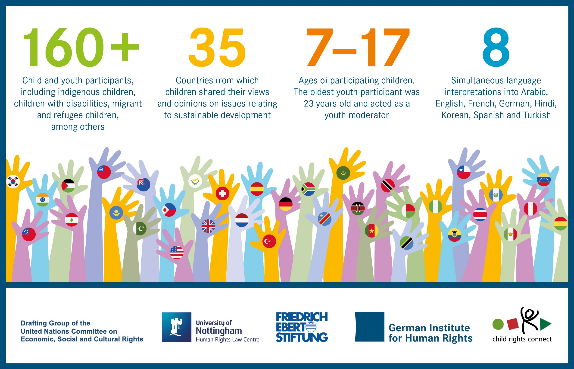
To keep children updated and share the significance of their contributions, two members of the Drafting Group published videos, sharing their reflections on the importance of these consultations and what they had learned. While the incorporation of children’s views into the General Comment is yet to be confirmed, this practice, building on our experience with the CRC Committee, paves the way for integrating child participation into the Working Methods of the Committee on Economic, Social and Cultural Rights, with the potential to inspire other Treaty Bodies.
Other mechanisms took steps to expand spaces for children
The Special Representative of the UN Secretary-General on Violence Against Children (SRSG on VAC) took a significant step by preparing, for the first time, a child-friendly version of her annual report for the Human Rights Council. Prior to presenting the report, she organised a dialogue with children, including members of our Children’s Advisory Team, to launch the report and gather their views. During the Interactive Dialogue between the SRSG on VAC and States at the Human Rights Council, our child advisor from Bolivia also spoke as a civil society representative, emphasizing the importance of accessibility and accountability of the UN to children.
Building on this positive development, the resolution on the rights of the child requested, for the first time, the Office of the High Commissioner for Human Rights (OHCHR) to produce a child-friendly version of its upcoming report on child rights for the Council. This is a crucial step, as the right to information is fundamental in allowing children to make informed decisions, as highlighted in the CRC Committee General Comment 12 on the right to be heard.
What results have we contributed to achieving? And what have we learned?
The 2022 external evaluation of our work revealed “positive outcomes” in our efforts to promote child participation. It highlighted impact at the individual level: children involved in our work have strengthened their skills, confidence, and networks, which has empowered them to continue championing child rights as human rights defenders. At the institutional level, the evaluation found that our work has contributed to durably changing attitudes and practices within UN human rights mechanisms.
Our child advisors too have emphasized the positive impact of being part of our Children’s Advisory Team.
Our child advisor from Lebanon said: “Child Rights Connect has empowered me to think creatively, participate in various UN activities, and contribute to important processes like the UN Guidance Note on Child Rights Mainstreaming.”
The draft Guidance Note reflects, to a large extent, children’s inputs and calls for a UN-wide policy framework on child participation and safeguarding.
Our work, with others, has not only allowed to create new spaces for child engagement in various fora – the COP27, ILO, UN Committee on Economic, Social and Cultural Rights, CRC Committee, and Special Procedures, among others – but also contributed to preventing the closure of existing spaces. Challenges however persist, reminding us of the importance of continuous advocacy, dialogue, and monitoring to advance children’s participation and empowerment.




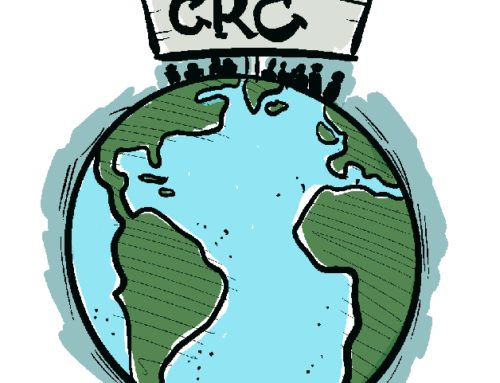

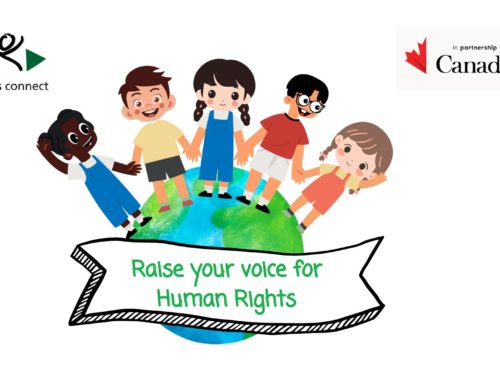



Leave A Comment